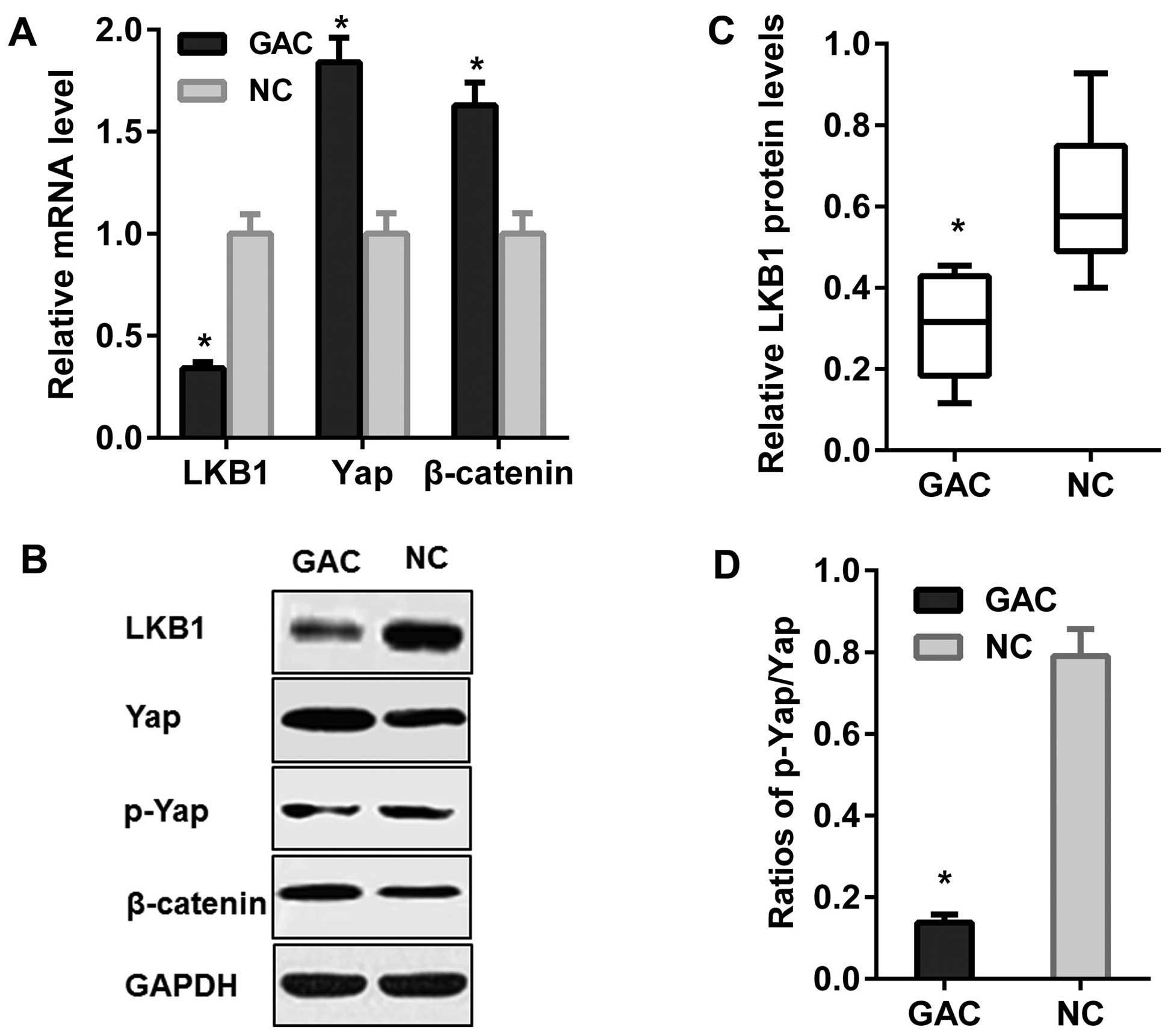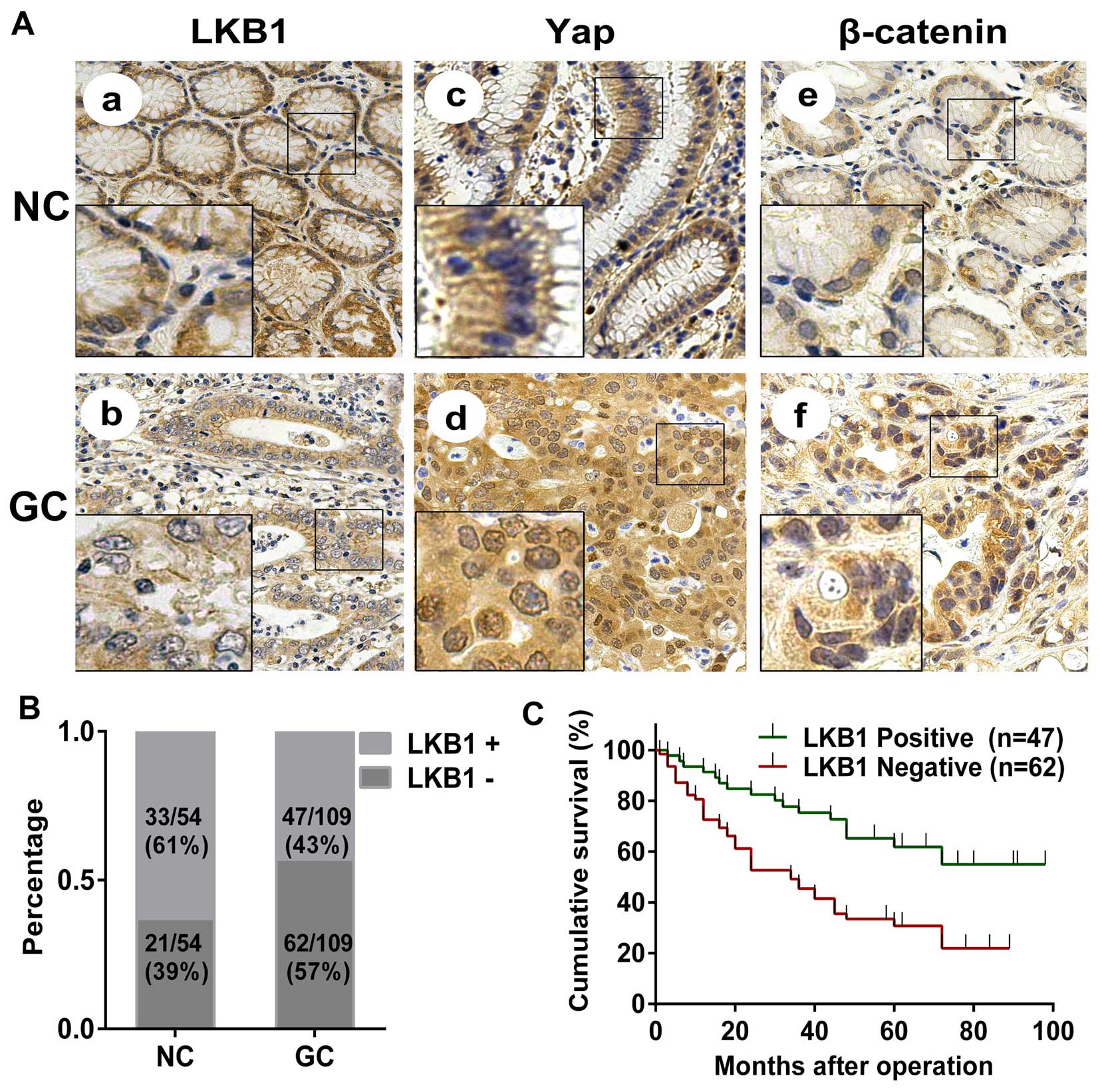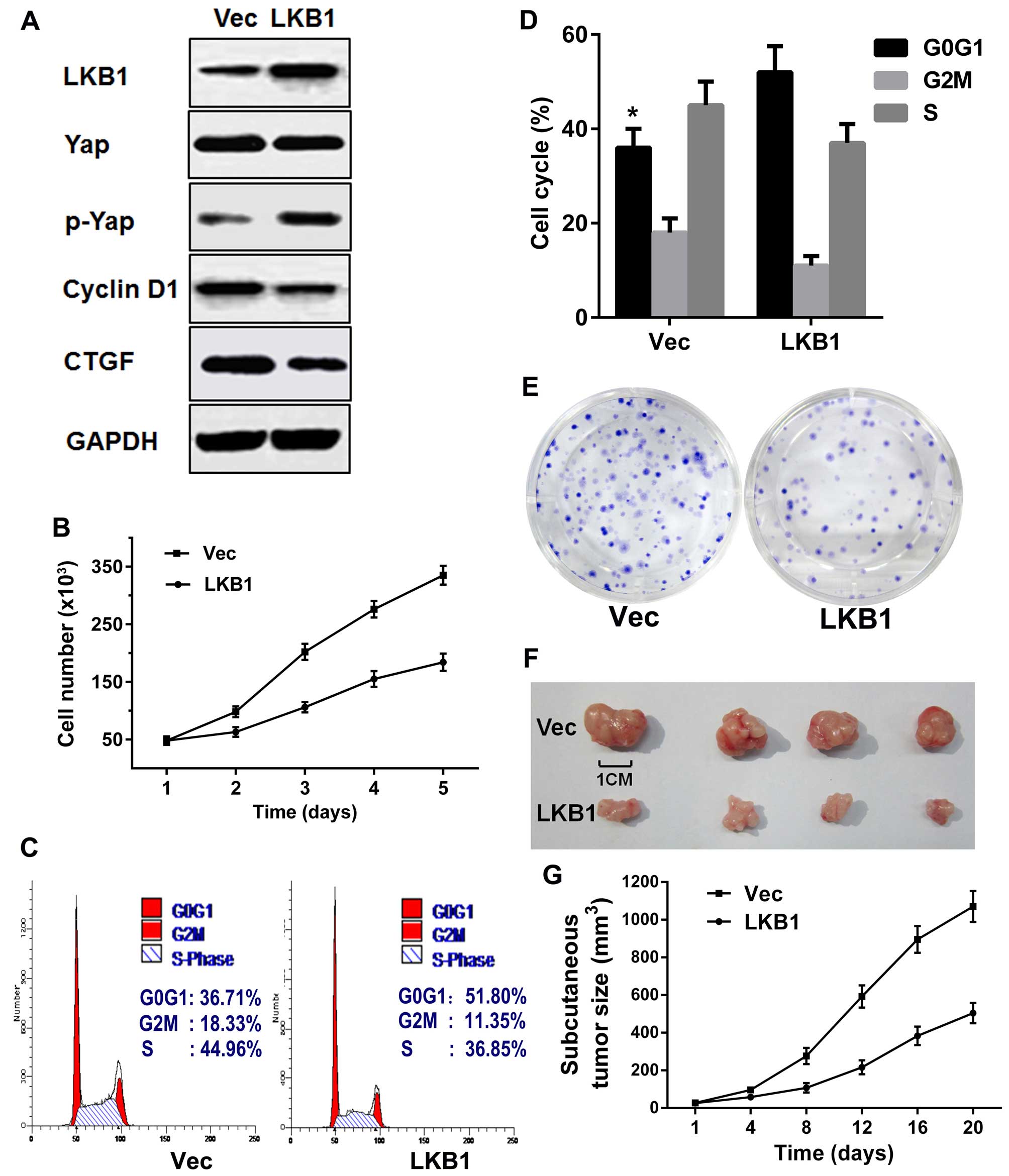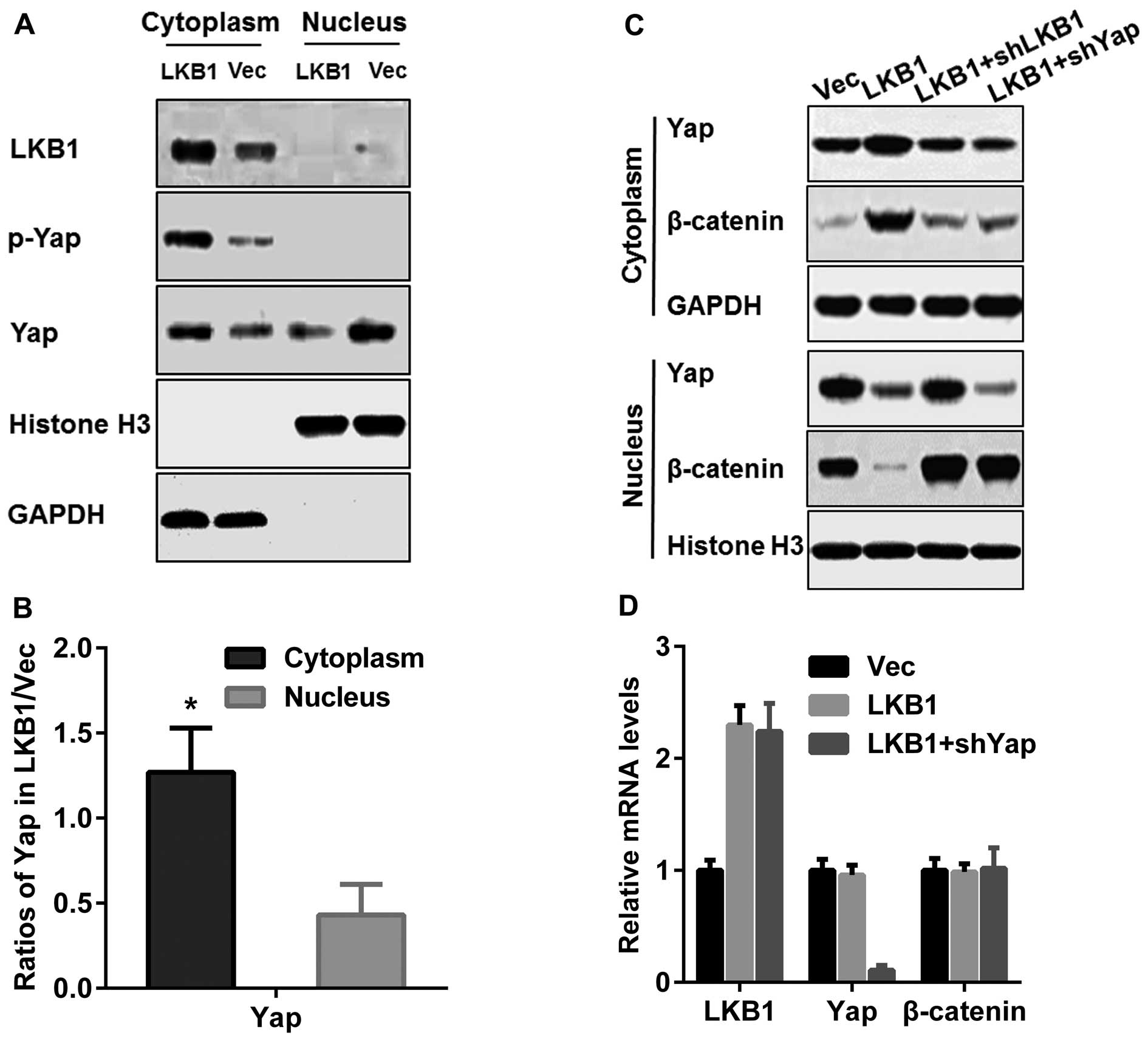|
1
|
Hemminki A, Markie D, Tomlinson I,
Avizienyte E, Roth S, Loukola A, Bignell G, Warren W, Aminoff M,
Höglund P, et al: A serine/threonine kinase gene defective in
Peutz-Jeghers syndrome. Nature. 391:184–187. 1998. View Article : Google Scholar : PubMed/NCBI
|
|
2
|
Gill RK, Yang SH, Meerzaman D, Mechanic
LE, Bowman ED, Jeon HS, Roy Chowdhuri S, Shakoori A, Dracheva T,
Hong KM, et al: Frequent homozygous deletion of the LKB1/STK11 gene
in non-small cell lung cancer. Oncogene. 30:3784–3791. 2011.
View Article : Google Scholar : PubMed/NCBI
|
|
3
|
Wingo SN, Gallardo TD, Akbay EA, Liang MC,
Contreras CM, Boren T, Shimamura T, Miller DS, Sharpless NE,
Bardeesy N, et al: Somatic LKB1 mutations promote cervical cancer
progression. PLoS One. 4:e51372009. View Article : Google Scholar : PubMed/NCBI
|
|
4
|
Kim CJ, Cho YG, Park JY, Kim TY, Lee JH,
Kim HS, Lee JW, Song YH, Nam SW, Lee SH, et al: Genetic analysis of
the LKB1/STK11 gene in hepatocellular carcinomas. Eur J Cancer.
40:136–141. 2004. View Article : Google Scholar
|
|
5
|
Birnbaum DJ, Adélaïde J, Mamessier E,
Finetti P, Lagarde A, Monges G, Viret F, Gonçalvès A, Turrini O,
Delpero JR, et al: Genome profiling of pancreatic adenocarcinoma.
Genes Chromosomes Cancer. 50:456–465. 2011. View Article : Google Scholar : PubMed/NCBI
|
|
6
|
Kim S, Lee J, Hong ME, Do IG, Kang SY, Ha
SY, Kim ST, Park SH, Kang WK, Choi MG, et al: High-throughput
sequencing and copy number variation detection using formalin fixed
embedded tissue in metastatic gastric cancer. PLoS One.
9:e1116932014. View Article : Google Scholar : PubMed/NCBI
|
|
7
|
Lee J, van Hummelen P, Go C, Palescandolo
E, Jang J, Park HY, Kang SY, Park JO, Kang WK, MacConaill L and Kim
KM: High-throughput mutation profling identifies frequent somatic
mutations in advanced gastric adenocarcinoma. PLoS One.
7:e388922012. View Article : Google Scholar
|
|
8
|
Fassan M, Simbolo M, Bria E, Mafficini A,
Pilotto S, Capelli P, Bencivenga M, Pecori S, Luchini C, Neves D,
et al: High-throughput mutation profiling identifies novel
molecular dysregulation in high-grade intraepithelial neoplasia and
early gastric cancers. Gastric cancer. 17:442–449. 2014. View Article : Google Scholar
|
|
9
|
Martin-Belmonte F and Perez-Moreno M:
Epithelial cell polarity, stem cells and cancer. Nat Rev Cancer.
12:23–38. 2012.
|
|
10
|
Mohseni M, Sun J, Lau A, Curtis S,
Goldsmith J, Fox VL, Wei C, Frazier M, Samson O, Wong KK, et al: A
genetic screen identifies an LKB1-MARK signalling axis controlling
the Hippo-YAP pathway. Nat Cell Biol. 16:108–117. 2014. View Article : Google Scholar :
|
|
11
|
Nguyen HB, Babcock JT, Wells CD and
Quilliam LA: LKB1 tumor suppressor regulates AMP
kinase/mTOR-independent cell growth and proliferation via the
phosphorylation of Yap. Oncogene. 32:4100–4109. 2013. View Article : Google Scholar
|
|
12
|
Patel K, Foretz M, Marion A, Campbell DG,
Gourlay R, Boudaba N, Tournier E, Titchenell P, Peggie M, Deak M,
et al: The LKB1-salt-inducible kinase pathway functions as a key
gluconeogenic suppressor in the liver. Nat Commun. 5:45352014.
View Article : Google Scholar : PubMed/NCBI
|
|
13
|
Lin YY, Kiihl S, Suhail Y, Liu SY, Chou
YH, Kuang Z, Lu JY, Khor CN, Lin CL, Bader JS, et al: Functional
dissection of lysine deacetylases reveals that HDAC1 and p300
regulate AMPK. Nature. 482:251–255. 2012. View Article : Google Scholar : PubMed/NCBI
|
|
14
|
Jian SF, Hsiao CC, Chen SY, Weng CC, Kuo
TL, Wu DC, Hung WC and Cheng KH: Utilization of liquid
chromatography mass spectrometry analyses to identify LKB1-APC
interaction in modulating Wnt/β-catenin pathway of lung cancer
cells. Mol Cancer Res. 12:622–635. 2014. View Article : Google Scholar : PubMed/NCBI
|
|
15
|
Jacob LS, Wu X, Dodge ME, Fan CW, Kulak O,
Chen B, Tang W, Wang B, Amatruda JF and Lum L: Genome-wide RNAi
screen reveals disease-associated genes that are common to Hedgehog
and Wnt signaling. Sci Signal. 4:ra42011. View Article : Google Scholar : PubMed/NCBI
|
|
16
|
Gao Y, Zhang W, Han X, Li F, Wang X, Wang
R, Fang Z, Tong X, Yao S, Li F, et al: YAP inhibits squamous
transdifferentiation of Lkb1-deficient lung adenocarcinoma through
ZEB2-dependent DNp63 repression. Nat Commun. 5:46292014. View Article : Google Scholar : PubMed/NCBI
|
|
17
|
Hsu YL, Hung JY, Chou SH, Huang MS, Tsai
MJ, Lin YS, Chiang SY, Ho YW, Wu CY and Kuo PL: Angiomotin
decreases lung cancer progression by sequestering oncogenic YAP/TAZ
and decreasing Cyr61 expression. Oncogene. 34:4056–4068. 2015.
View Article : Google Scholar
|
|
18
|
Azzolin L, Panciera T, Soligo S, Enzo E,
Bicciato S, Dupont S, Bresolin S, Frasson C, Basso G, Guzzardo V,
et al: YAP/TAZ incorporation in the β-catenin destruction complex
orchestrates the Wnt response. Cell. 158:157–170. 2014. View Article : Google Scholar : PubMed/NCBI
|
|
19
|
Imajo M, Miyatake K, Iimura A, Miyamoto A
and Nishida E: A molecular mechanism that links Hippo signalling to
the inhibition of Wnt/β-catenin signalling. EMBO J. 31:1109–1122.
2012. View Article : Google Scholar : PubMed/NCBI
|
|
20
|
Lee SJ, Kang BW, Chae YS, Kim HJ, Park SY,
Park JS, Choi GS, Jeon HS, Lee WK and Kim JG: Genetic variations in
STK11, PRKAA1, and TSC1 associated with prognosis for patients with
colorectal cancer. Ann Surg Oncol. 21(Suppl 4): S634–S639. 2014.
View Article : Google Scholar : PubMed/NCBI
|
|
21
|
Frau M, Feo F and Pascale RM: Pleiotropic
effects of methionine adenosyltransferases deregulation as
determinants of liver cancer progression and prognosis. J Hepatol.
59:830–841. 2013. View Article : Google Scholar : PubMed/NCBI
|
|
22
|
Tsai LH, Chen PM, Cheng YW, Chen CY, Sheu
GT, Wu TC and Lee H: LKB1 loss by alteration of the NKX2-1/p53
pathway promotes tumor malignancy and predicts poor survival and
relapse in lung adenocarcinomas. Oncogene. 33:3851–3860. 2014.
View Article : Google Scholar
|
|
23
|
Morton JP, Jamieson NB, Karim SA, Athineos
D, Ridgway RA, Nixon C, McKay CJ, Carter R, Brunton VG, Frame MC,
et al: LKB1 haploinsufficiency cooperates with Kras to promote
pancreatic cancer through suppression of p21-dependent growth
arrest. Gastroenterology. 139:586–597. 597.e581–586. 2010.
View Article : Google Scholar : PubMed/NCBI
|
|
24
|
Bouchekioua-Bouzaghou K, Poulard C,
Rambaud J, Lavergne E, Hussein N, Billaud M, Bachelot T, Chabaud S,
Mader S, Dayan G, et al: LKB1 when associated with methylatedERα is
a marker of bad prognosis in breast cancer. Int J Cancer.
135:1307–1318. 2014.PubMed/NCBI
|
|
25
|
Xi HQ, Wu XS, Wei B and Chen L: Aberrant
expression of EphA3 in gastric carcinoma: correlation with tumor
angiogenesis and survival. J Gastroenterol. 47:785–794. 2012.
View Article : Google Scholar : PubMed/NCBI
|
|
26
|
Wood LD, Calhoun ES, Silliman N, Ptak J,
Szabo S, Powell SM, Riggins GJ, Wang TL, Yan H, Gazdar A, et al:
Somatic mutations of GUCY2F, EPHA3, and NTRK3 in human cancers. Hum
Mutat. 27:1060–1061. 2006. View Article : Google Scholar : PubMed/NCBI
|
|
27
|
Jiao S, Wang H, Shi Z, Dong A, Zhang W,
Song X, He F, Wang Y, Zhang Z, Wang W, et al: A peptide mimicking
VGLL4 function acts as a YAP antagonist therapy against gastric
cancer. Cancer Cell. 25:166–180. 2014. View Article : Google Scholar : PubMed/NCBI
|
|
28
|
Radulescu S, Ridgway RA, Cordero J,
Athineos D, Salgueiro P, Poulsom R, Neumann J, Jung A, Patel S,
Woodgett J, et al: Acute WNT signalling activation perturbs
differentiation within the adult stomach and rapidly leads to
tumour formation. Oncogene. 32:2048–2057. 2013. View Article : Google Scholar :
|
|
29
|
Aihara R, Mochiki E, Nakabayashi T,
Akazawa K, Asao T and Kuwano H: Clinical significance of mucin
phenotype, beta-catenin and matrix metalloproteinase 7 in early
undifferentiated gastric carcinoma. Br J Surg. 92:454–462. 2005.
View Article : Google Scholar
|
|
30
|
Zhang N, Wei P, Gong A, Chiu WT, Lee HT,
Colman H, Huang H, Xue J, Liu M, Wang Y, et al: FoxM1 promotes
β-catenin nuclear localization and controls Wnt target-gene
expression and glioma tumorigenesis. Cancer Cell. 20:427–442. 2011.
View Article : Google Scholar : PubMed/NCBI
|
|
31
|
Ehsanian R, Brown M, Lu H, Yang XP,
Pattatheyil A, Yan B, Duggal P, Chuang R, Doondeea J, Feller S, et
al: YAP dysregulation by phosphorylation or ΔNp63-mediated gene
repression promotes proliferation, survival and migration in head
and neck cancer subsets. Oncogene. 29:6160–6171. 2010. View Article : Google Scholar : PubMed/NCBI
|
|
32
|
Ossipova O, Bardeesy N, DePinho RA and
Green JB: LKB1 (XEEK1) regulates Wnt signalling in vertebrate
development. Nat Cell Biol. 5:889–894. 2003. View Article : Google Scholar : PubMed/NCBI
|
|
33
|
Yan D, Avtanski D, Saxena NK and Sharma D:
Leptin-induced epithelial-mesenchymal transition in breast cancer
cells requires β-catenin activation via Akt/GSK3- and MTA1/Wnt1
protein-dependent pathways. J Biol Chem. 287:8598–8612. 2012.
View Article : Google Scholar : PubMed/NCBI
|
|
34
|
Rosenbluh J, Nijhawan D, Cox AG, Li X,
Neal JT, Schafer EJ, Zack TI, Wang X, Tsherniak A, Schinzel AC, et
al: β-Catenin-driven cancers require a YAP1 transcriptional complex
for survival and tumorigenesis. Cell. 151:1457–1473. 2012.
View Article : Google Scholar : PubMed/NCBI
|
|
35
|
Konsavage WM Jr, Kyler SL, Rennoll SA, Jin
G and Yochum GS: Wnt/β-catenin signaling regulates Yes-associated
protein (YAP) gene expression in colorectal carcinoma cells. J Biol
Chem. 287:11730–11739. 2012. View Article : Google Scholar : PubMed/NCBI
|
|
36
|
Seo E, Basu-Roy U, Gunaratne PH, Coarfa C,
Lim DS, Basilico C and Mansukhani A: SOX2 regulates YAP1 to
maintain stemness and determine cell fate in the osteo-adipo
lineage. Cell Rep. 3:2075–2087. 2013. View Article : Google Scholar : PubMed/NCBI
|


















